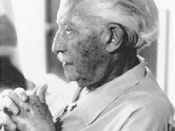Psychological development can be determined in several different ways, by observing children and how they react in different situations. Children behave differently in different environments because their temperament and personality development affects how they react. Different relationships between children and adults are better known as an attachment, which can also affect children as well. Peers and television play an important role in psychological development too. All of these behaviors together are valuable in understanding psychological development.
While observing children in everyday life, it was noticed that many of them had a variety of temperaments. The one that stood out the most were the easy children. With this being said, the children had a calm and collective attitude. They had a lot of energy and loved to interact with the other kids. They adapted well with each other, although with difficult children, it was noticed that the moods changed quite often, and there was no consistent behavior.
They did not adapt well and seem to be relatively angry most of the time. They were very active and it was never known what was coming next. Overall, they did not seem very happy and did not enjoy the environment and their surroundings.
Temperament is something every child goes through. Physicians, Alexander Thomas and Stella Chess (1980) examined a cohort of children and identified three types of temperament (Davis & Palladino, pg.375). The first is easy children (40%) which behaved in consistent ways. This had a positive approach to new situations, and was highly adaptable to change. Their moods were mild to moderate and mostly positive. The easy child has a moderate activity level, is regular, adaptable, approach-oriented, and has a positive mood. The second is slow-to-warm-up children. Fifteen percent of the children displayed a combination of intense, negative responses to new stimuli...



Consistent
consistent and clear, it makes sense and give a good explnations of some infant behaviors
1 out of 1 people found this comment useful.